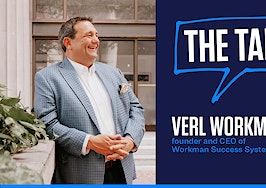This report is available exclusively to subscribers of Inman Intel, a data and research arm of Inman offering deep insights and market intelligence on the business of residential real estate and proptech. Subscribe today.
It’s one of the key dividing lines in the brokerage world.
Some swear by the traditional real estate brokerage model of Compass and Anywhere which provides a robust structure of support and office space for agents. Others lean toward the low-fee model — think eXp Realty, the Real Brokerage, Fathom and others — that leaves a greater share of commissions in their hands.

Mike DelPrete
Armed with data on each of the major brokerages, industry analyst Mike DelPrete recently asked: Why have the low-fee models been more profitable? Why are they growing more quickly? And does their relative lack of investment in support result in less productivity?
DelPrete joined Intel over video chat to discuss what he learned about the two main brokerage models — and to revisit the barbs that have been thrown by each side over the years. His comments below have been edited for length and clarity.
Intel: On a surface level, you’d think the most profitable brokerages would be the ones keeping the biggest cut of revenues. But that’s not what you found. What do you think is going on here? Why are the brokerages that keep the biggest cut of revenues struggling the most with profitability?
DelPrete: To start out, what I’m looking at here is brokerage business models. So this is top-down, analyzing brokerage businesses. This is not bottom-up for agents, figuring out where agents can make more money or be more successful. If you’re an investor, you care about averages, you care about totals, you care about profits and loss. And that’s what profitability looks at.
So before this, I looked at just simply how much of a brokerage’s commission they pay out back to agents, through whatever mechanism. It can be profit-sharing, revenue-sharing, commission splits. Brokerages can claw some of it back through technology fees, desk fees, monthly fees — whatever. It actually doesn’t matter what it is. There’s a dollar figure. There’s total revenue, and there’s the percent that gets paid back out to agents.
And that was really interesting, because you have a group of brokerages — these low-fee models, cloud brokerages, whatever you want to call them. They’re clearly, as a business, paying out a larger percentage of their revenue than some of the legacy brands like Compass and Anywhere, which are paying out more of your standard commission splits — something like 80-20, whereas the low-fee models were closer to 95-5.
And then the No. 1 bit of feedback I got on that was, ‘Yeah, well, that’s all well and good, but if you’re paying out all your revenue to agents, you can’t possibly make money. That’s not a stable business model.’ So I looked at the profitability, and yeah, lo and behold, it was pretty counterintuitive, but really revealing.
If you look at the brokerages that are paying out more of the revenue to agents, those are really clearly profitable — or much closer to profitability — than those legacy brands. Like exponentially so. You can’t ignore that.
Now they’re not profitable because they’re paying out more of the revenue to agents. That doesn’t make sense. They’re profitable because, from the ground up, they’re built a different way. They’re built to be much lower-cost, lower-overhead, leaner, tighter, more agile organizations. So what that means is their operating expenses are exponentially lower than these legacy brands.
Take eXp and Compass, for example. Compass has tons of offices. Office space is the No. 1 expense for a brokerage. EXp has no offices. It’s zero.
Or you have technology. How much money is a company investing in technology vs. the low-fee models? What is the technology doing? Is it all singing, all dancing, everything to everyone? Or is it really focused on brokerage productivity?
So there’s a lot of differences in those models, but if I’m an investor sitting on the sidelines, the differences are clear. And in the market right now — and it’s not to say that things won’t change — but in the market right now, profitability eludes those legacy brokerages. And the low-fee models definitely have something going for them.
It is really interesting — because of how counterintuitive it is as you mentioned — that we see this. I’m wondering how much of it might be due to where we are in the market right now. Is the low-fee brokerage an inherently more profitable model, or is it just a reflection of the time that we’re in right now?
Well, it’s definitely a reflection of the market. But is it more profitable? I don’t know.
On the one hand, yeah, you could say the legacy brokerage model, they are retaining more revenue, so yes, they can be profitable. And they can be much more profitable given very favorable market conditions and given healthy growth in the number of agents and transactions.
But if they’re relatively flat in a flat market, and the other models are growing in a flat market, the unit economics are less profitable, but they’re growing. So the denominator’s getting bigger and they will end up being more profitable.
You had this second counterintuitive finding. You’d think having more support staff would empower agents to be more productive and possibly make more in commissions on more transactions. It’s been talked about for a lot of years by a lot of different brokerages. But that’s not what you found either.
Yeah, this is what it sounds like when you get smacked in the face with data. It’s easy to have opinions. It’s more difficult to find the data.
But yeah, it’s pretty clear. I think what that data and what the evidence shows is that this commonly hyped-up hypothesis, typically from people who are affiliated with legacy brokerages, is that agents at these low-fee models like eXp are less professional, they’re less productive, they don’t get any support, and they’re just kind of on their own, and most of them just wither and die on the vine. And the evidence doesn’t support that.
The evidence actually shows that, no, in the aggregate, these agents are just as productive as any other agent at any of these other legacy brokerages. So your billion-dollar technology investment, your thousands of people supporting agents with marketing — all of that — at the end of the day, it’s not moving the needle.
And yeah, sure, agents at eXp or any of the low-fee brokerages, maybe they have to pay for the stuff on their own. I don’t know. People are going to do whatever works for them. But from a brokerage business-model standpoint, it doesn’t matter. Agents can do whatever they want, and if Compass and Anywhere are retaining more of the money, and providing more support, or eXp is paying out more money and providing “less” support — because I don’t know that that’s true — well, then the agent can choose how they want to spend their money and on what kind of support.
From the perspective of, say, one of the legacy brokerages, do you think there’s a lesson here? Should they be thinking of ways to pivot more in the direction of some of these lower-fee brokerages? Or is that too simplistic a reading?
I think every boardroom of every legacy brokerage should be looking at this and having these discussions to figure out what the strategy is and what the plan is. And that’s not PR, hype B.S. That’s actually looking at the data and figuring out what they want to be when they grow up.
And I don’t know what the right answer is. It’s going to depend on every business. But it’s unavoidable, and it’s unignorable. You can’t just pretend this isn’t happening, and you can’t just dismiss them.
I see so many people are dismissive, like, “Oh, they don’t do that.” It doesn’t matter. Like, they are doing that. That’s not to say every legacy brokerage needs to directly compete with a low-fee model. But every legacy brokerage needs a plan. And the plan could be, let’s just stick to our knitting and we are who we are, and we’re going to keep being the best version of this that we can.
But again, if you’re an outside observer, if you’re an investor and you’re thinking about growth stocks — growth businesses — vs. incumbents kind of floating along at the status quo, the picture there is pretty clear.
Right now, in this market, businesses that are growing are the low-fee models.













